 Image search results - "taiga" Image search results - "taiga" |
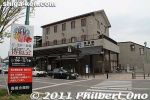
In 2011, the Go and Azai Sisters Expo is publicized everywhere in Nagahama. This is the east side of Nagahama Station.
|
|
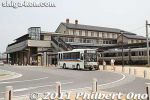
Go to the west side of Nagahama Station to catch the shuttle bus going to the Go and Azai Sisters Expo pavilions. Buy the roundtrip bus ticket at the little office near the bus stop at the train station.
|
|
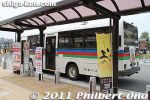
The 1,000 yen ticket includes admission to all three pavilions and roundtrip shuttle bus fare. Best to go the Odani pavilion first, then the Azai pavilion, and the central Nagahama pavilion on the way back.
|
|

The shuttle bus leaves once or twice an hour. It comes with a bus guide.
|
|

The Odani pavilion is at the foot of Odani Castle. Shuttle buses run between the three pavilions. Best to take a shuttle bus from Nagahama Station (West exit) and go directly to this pavilion.
|
|

Path to the Odani pavilion called Odani–Go no Furusato-kan (小谷・江のふるさと館).
|
|
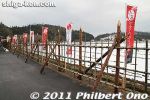
Fence modeled after a samurai battle fence.
|
|
|
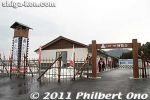
Odani–Go no Furusato-kan (小谷・江のふるさと館) in Odani.
|
|
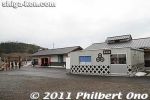
Rear view of Odani–Go no Furusato-kan (小谷・江のふるさと館) pavilion. The building in the foreground is a small gift shop.
|
|
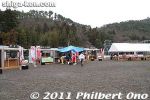
Outside the pavilion are food stalls and covered picnic tables.
|
|
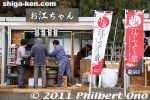
Food stall named "Ogo-chan."
|
|

Map of area surrounding the Odani pavilion.
|
|

Inside the Odani pavilion is this samurai costume which you can wear and take pictures of yourself.
|
|
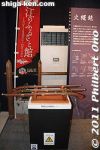
Also replica matchlock guns.
|
|
|
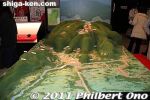
The Odani pavilion's most impressive exhibit was this scale model of Mt. Odani with Odani Castle in its heyday. On the left, you can also see Mt. Toragozen where Nobunaga's troops were perched to attack Odani Castle.
|
|
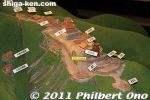
Model of Odani Castle. The mountain is quite steep and it was a difficult place to live logistically so normally, the castle lord and his family lived in the valley on the left side of the mountain.
|
|
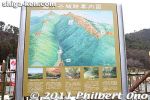
Map of Mt. Odani. From the Odani pavilion, there are shuttle buses going to Odani Castle. The roundtrip fare is 500 yen. It is a guided tour to the main parts of Odani Castle ruins. Photos here.
|
|

At the Odani pavilion at the foot of Mt. Odani, a shuttle bus to Odani Castle with a tour guide is provided for 500 yen roundtrip during 2011. A lot easier than walking up the mountain.
|
|
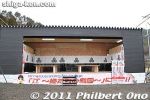
Outside the Odani pavilion is this outdoor stage. On weekends, a drama troupe performs.
|
|
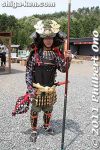
Samurai
|
|
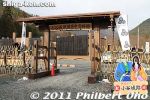
Entrance to Odani Castle Sengoku Historical Museum (小谷城戦国歴史資) opened in fall 2007. The museum is in the valley adjacent to Mt. Odani. Although the castle was atop the mountain, the castle lord and his family (Azai sisters) normally lived i
|
|
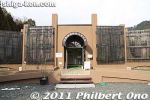
Odani Castle Sengoku Historical Museum. Admission 300 yen (not included in the expo ticket price). Can't take photos inside, but there are two small exhibition rooms explaining about the Azai clan and Odani Castle. No English.
|
|
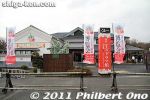
The third and main pavilion is in Azai. This is where the expo's opening ceremony was held on Jan. 15, 2011 with Shiga Governor Kada Yukiko and actor Tokito Saburo in attendance.
|
|

Statue of the Azai family in front of the Azai pavilion. As soon as they arrive here, most visitors take a picture of this sculpture.
|
|

About the Azai family sculpture. There's Nagamasa, Oichi, Chacha, Ohatsu Go, and Manpukumaru. They are gazing at Lake Biwa and Chikubushima from Odani.
|
|

The Azai pavilion is called Azai–Go no Drama-kan (浅井・江のドラマ館). It displays kimono worn by the actresses (Ueno Juri, Miyazawa Rie) and samurai armor worn by the actors playing Oda Nobunaga and Azai Nagamasa. There’s also a small video
|
|
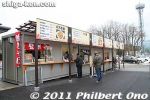
Food stalls
|
|
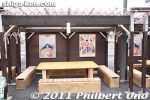
Table for food stalls.
|
|

Vending machines with Azai sisters moif.
|
|

Inside the ift shop. This is the expo's largest gift shop. Buy your Azai sisters souvenirs and guide books here next to the Azai pavilion.
|
|

Gift shop
|
|

Go and Azai Sisters Expo banner.
|
|

Shuttle bus to go to the next pavilion. They start from Nagahama Station's west exit and go to all three pavilions with stops at major attractions along the way. A bus guide is aboard the us.
|
|
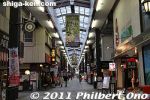
Otemon-dori shopping arcade in central Nagahama with banners showing the way to the Go and Azai Sisters Expo venue. The expo has three pavilions in three different locations: central Nagahama, Odani, and Azai.
|
|
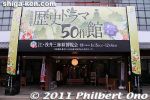
Across from the Nagahama Hikiyama Museum is the first Go and Azai Sisters Expo paviion called Nagahama Kurokabe Rekishi Drama 50-saku-kan (長浜黒壁・歴史ドラマ50作館).
|
|

This pavilion is actually a small exhibition room on the 2nd floor of a small shopping complex. It has panel displays of past NHK Taiga Dramas (50 of them) and a small video theater.
|
|
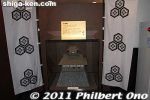
Photography is not allowed inside the pavilions except for certain objects. Model of Odani Castle. This pavilion next to the Hikiyama Museum does not have much. See it only if you have time or if you're a Taiga Drama fan.
|
|
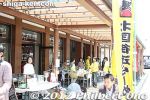
Nagahama Sengoku Taiga Furusato-haku, or Nagahama Warring States Hometown Expo, is a feudal history expo being held from March 24 to Dec. 2, 2012. JR Kinomoto Station on the Hokuriku Line is abuzz during the expo.
|
|

Mitsunari-kun is the official mascot of the Nagahama Sengoku Taiga Furusato-haku expo. The expo highlights three areas of interest in Nagahama: Odani Castle and Azai, Kinomoto and Mt. Shizugatake, and central Nagahama and Chikubushima island.
|
|

Since the main expo pavilion is in Kinomoto, I started in Kinomoto. The expo focuses on the Battle of Shizugatake and Anegawa River.
|
|
|
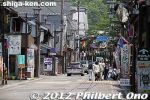
The main pavilion in Kinomoto is a short walk from Kinomoto Station. Jizo-zaka sloping road going to the Hokkoku Kaido road.
|
|
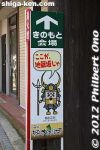
The way to the Kinomoto pavilion is marked with these signboards pointing the way by one of the seven "spearing" samurai famous for fighting in the Battle of Shizugatake.
|
|
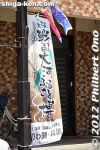
Expo banners also line the way to the Kinomoto pavilion.
|
|
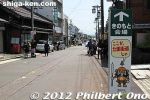
When you reach Hokkoku Kaido road where you see the Jizo-in temple, turn right.
|
|
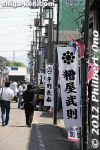
Banners with the names of the seven spearing samurai.
|
|
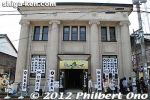
Kinomoto expo pavilion. 戦国大河きのもと館
|
|
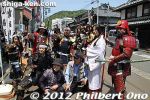
When I got to the Kinomoto Pavilion, this samurai drama group was there posing for photos with tourists.
|
|
|
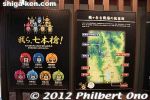
Inside the Kinomoto Pavilion.
|
|
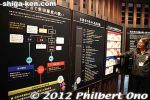
A guide explains about the Battle of Shizugatake inside the Kinomoto Pavilion.
|
|
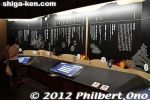
The Kinomoto Pavilion centers on the Battle of Shizugatake in May 1583 between Toyotomi Hideyoshi and Shibata Katsuie who lost.
|
|
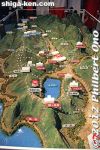
Model of the Battle of Shizugatake site at Mt. Shizugatake and Lake Yogo. It explained how the forces of both sides gathered in this area and fought/retreated.
|
|
|
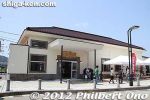
Old Kinomoto Station has been totally renovated.
|
|

Inside the old Kinomoto Station. They made it photo op place with a steam locomotive photo in the background.
|
|
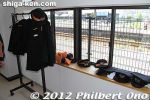
You could even dress up as a train conductor.
|
|

Bus stop at Kinomoto Station to visit Mt. Shizugatake.
|
|

Buses leave Kinomoto Station every 30 min. from 9:45 am to 4:15 pm. It takes less than 10 min. to Mt. Shizugatake.
|
|

Top of Mt. Shizugatake accessible by chair lift. Great views at the top of Lake Biwa and Lake Yogo.
|
|
|
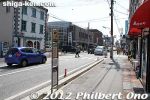
There are no buses connecting Kinomoto to Nagahama. So take the train. Central Nagahama and the bus stop to visit Azai Folk Museum and Odani Castle.
|
|
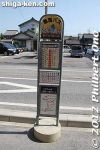
Bus stop in central Nagahama nearest to the Nagahama Pavilion. Bus pass is 500 yen for all day.
|
|
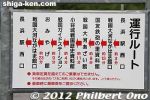
Route of the expo shuttle bus from Nagahama Station. It goes to Kunimoto Gun Museum, Azai Pavilion (Folk Museum), and Odani Castle Guide Station where you can catch the bus to visit Odani Castle.
|
|

Route of the expo shuttle bus from Nagahama Station.
|
|
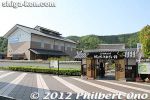
Azai Folk History Museum 浅井歴史民俗資料館(お市の里)
|
|
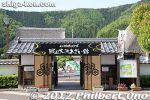
Entrance to Azai Folk History Museum where one of the buildings is the expo's Azai Paviion. Admission 300 yen.
|
|

Map of Azai Folk History Museum which is a complex of small museum buildings including two thatched-roof homes.
|
|
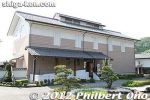
The Azai Paviion is this Folk Studies Museum or Kyodo Gakushu-kan. It centers on the history of Odani Castle and three generations of the Azai Clan. 郷土学習館
|
|
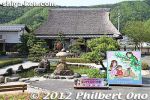
The thatched-roof house in the middle is Shichirinkan, a former blacksmith's house. 七りん館
|
|
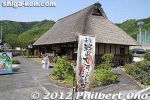
On the right is Itohime no Yakata which shows Azai's silk production history. 糸姫の館
|
|

Inside the Azai Paviion is this small theater showing a video of the Battle of Anegawa.
|
|

Small theater showing a video of the Battle of Anegawa.
|
|
|
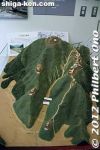
Model of Mt. Odani.
|
|

First floor of Azai Pavilion.
|
|
|
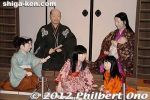
Second floor of Azai Pavilion has mannequins of the Azai family with the three Azai sisters as infants.
|
|
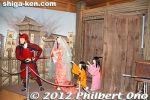
Depicting the escape of Ichi and the three Azai sisters from Odani Castle as it was attacked by Hideyoshi.
|
|
|
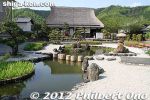
The thatched-roof house is Shichirinkan, a former blacksmith's house. 七りん館
|
|
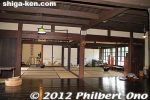
Inside Shichirinkan, a former blacksmith's house. 七りん館
|
|
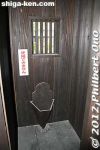
Old toilet inside Shichirinkan, a former blacksmith's house. 七りん館
|
|
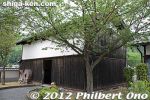
Next to Shichirinkan is this small Blacksmith's Workplace.
|
|
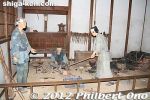
Inside the Blacksmith's Workplace is this exhibit of blacksmiths at work.
|
|
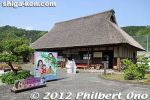
This is the Itohime no Yakata which shows Azai's silk production history. 糸姫の館
|
|
|
|
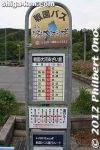
Bus stop at Azai Paviion. Next stop is the Odani area.
|
|
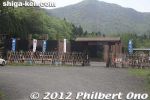
Bus goes to Odani Castle Sengoku Historical Museum (小谷城戦国歴史資) opened in fall 2007. The museum is in the valley adjacent to Mt. Odani.
|
|
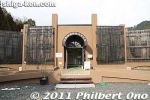
Odani Castle Sengoku Historical Museum. Admission 300 yen (not included in the expo ticket price). Can't take photos inside, but there are two small exhibition rooms explaining about the Azai clan and Odani Castle. No English.
|
|
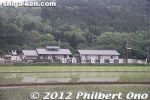
Sengoku Guide Station at the foot of Mt. Odani. This is where you board the bus to go up Odani Castle with a tour guide. This was the Odani–Go no Furusato-kan (小谷・江のふるさと館) pavilion during the Azai Sisters Expo in 2011. Only an expo o
|
|
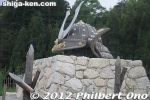
Giant samurai helmet at the Sengoku Guide Station.
|
|

Odani Castle
|
|

View from Mt. Odani.
|
|
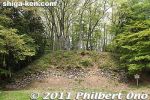
Odani Castle Honmaru stone wall.
|
|
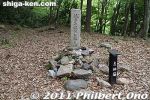
Where Azai Nagamasa committed suicide at Odani Castle when it was under attack by Hideyoshi.
|
|

Graves of the Azai clan at
|
|

During the Azai Sisters Expo in 2011, this was the Azai–Go no Drama-kan (浅井・江のドラマ館). Now it's a gift and produce shop.
|
|
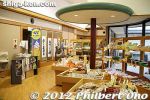
Inside the gift and produce shop.
|
|
|

Inside the gift and produce shop. This was where they displayed kimono in 2011. Now a gallery.
|
|
|
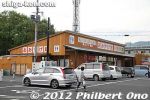
Tourist gift shop.
|
|

Tourist gift shop.
|
|

The tourist gift shop has a Go and Azai Sisters Memorial Hall. Good to visit if you missed last year's expo.
|
|

Go and Azai Sisters Memorial Hall
|
|

Go and Azai Sisters Memorial Hall
|
|
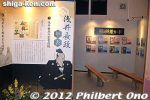
Go and Azai Sisters Memorial Hall
|
|
|
|
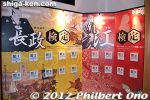
Go and Azai Sisters Memorial Hall
|
|
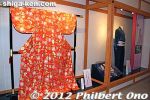
These were displayed at last year's Azai Sisters Expo.
|
|
|
|
|
|
|
|
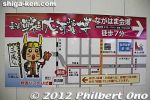
When you get out of Nagahama Station, you see this sign/map showing the way to the Nagahama Pavilion, a short walk.
|
|
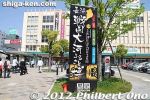
In front of Nagahama Station.
|
|

A hime princess posing in the shopping arcade in Nagahama, Shiga.
|
|
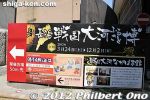
Way to the Nagahama Pavilion.
|
|
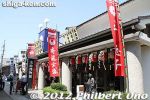
Hikiyama Festival Museum.
|
|
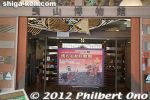
Hikiyama Festival Museum.
|
|
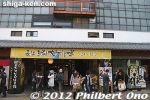
Across from the Nagahama Hikiyama Museum is the Nagahama Pavilion. In 2011 for the Go and Azai Sisters Expo paviion, this was the Nagahama Kurokabe Rekishi Drama 50-saku-kan (長浜黒壁・歴史ドラマ50作館).
|
|
|

The Nagahama Pavilion shows the history of NHK Taiga Drama series over the last 50 years. Almost the same as last year's Go and Azai Sisters Expo.
|
|
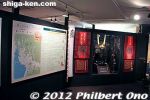
The Nagahama Pavilion includes a few exhibits, including kimono.
|
|
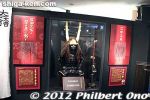
Nagahama Pavilion
|
|
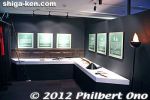
Nagahama Pavilion
|
|
|
|
|